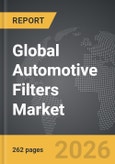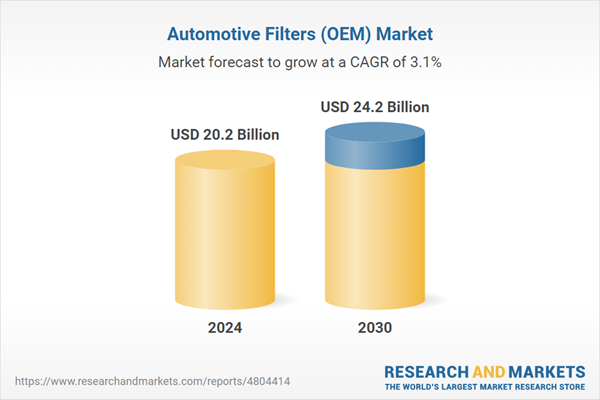Global Automotive Filters (OEM) Market - Key Trends and Drivers Summarized
How Are Automotive Filters Crucial to Vehicle Performance and Longevity?
Automotive filters are essential components in vehicles, playing a vital role in maintaining the performance, efficiency, and longevity of the engine and other critical systems. These filters, including air, oil, fuel, and cabin filters, are designed to remove contaminants and impurities from various fluids and airflows within the vehicle. For instance, air filters prevent dirt, dust, and debris from entering the engine, ensuring that it operates efficiently and reduces wear and tear over time. Oil filters trap metal particles, dirt, and other contaminants from the engine oil, which helps in maintaining the lubrication of engine components, thus prolonging engine life. Fuel filters are crucial in ensuring that the fuel delivered to the engine is free from particulates that could clog injectors or cause engine malfunctions. Cabin air filters enhance passenger comfort by filtering out pollen, dust, and other airborne particles, providing cleaner air inside the vehicle. Together, these filters are indispensable in maintaining optimal vehicle performance and ensuring that vehicles meet stringent emission standards.What Are the Technological Advances Shaping Automotive Filters?
The automotive filters market is undergoing significant technological advancements, driven by the need for improved efficiency, sustainability, and compliance with evolving emission regulations. One of the most notable advancements is the development of high-efficiency particulate air (HEPA) filters, which are becoming increasingly popular in cabin air filtration due to their ability to capture ultra-fine particles, including bacteria and viruses. Additionally, the use of synthetic materials in filter media has enhanced the durability and filtration capacity of automotive filters, enabling them to perform better under extreme conditions and over extended service intervals. The integration of sensors and diagnostic systems into filters is another emerging trend, allowing for real-time monitoring of filter conditions and predictive maintenance. This not only helps in ensuring the optimal functioning of the vehicle but also aligns with the broader industry shift towards connected and smart vehicles. Furthermore, advancements in nanotechnology are enabling the creation of filters with enhanced surface areas and improved filtration efficiencies, which are particularly beneficial in meeting the stringent emission standards imposed by governments worldwide.What Are the Emerging Trends and Challenges in the Automotive Filters Market?
The automotive filters market is experiencing several emerging trends and challenges that are reshaping the landscape for original equipment manufacturers (OEMs). One significant trend is the increasing emphasis on sustainability, with manufacturers focusing on developing filters that are not only more efficient but also environmentally friendly. This includes the use of biodegradable materials and the reduction of plastic components in filter production. Another trend is the growing demand for electric vehicles (EVs), which, while reducing the need for certain traditional filters like oil filters, are driving demand for advanced cabin air filters and particulate filters to maintain air quality in vehicles that rely on battery systems. The rise of turbocharged engines in vehicles is also influencing the market, as these engines require high-performance air and fuel filters to operate effectively. However, the market also faces challenges, such as the pressure to reduce costs while meeting high-performance standards, and the need to adapt to the rapidly changing regulatory environment. The competition among OEMs to differentiate their products with superior filter technology adds another layer of complexity to the market dynamics.What Is Driving the Growth in the Automotive Filters Market?
The growth in the automotive filters market is driven by several factors, each contributing to the increasing demand for advanced filtration solutions in vehicles. Technological advancements in filter materials and designs are a significant driver, enabling the development of filters that offer better performance, longer service life, and enhanced environmental sustainability. The rise in global automotive production, particularly in emerging economies, is expanding the market for OEM filters, as more vehicles on the road translate to higher demand for original equipment parts. The increasing consumer awareness of air quality and health is driving demand for high-efficiency cabin air filters, especially in regions with high pollution levels. Additionally, stringent government regulations regarding vehicle emissions are compelling automakers to integrate more efficient air, fuel, and oil filters to meet compliance standards. The shift towards electric and hybrid vehicles is also influencing the market, as these vehicles require specialized filtration systems to manage battery cooling and air quality within the cabin. Together, these factors are propelling the automotive filters market towards sustained growth, with OEMs playing a crucial role in meeting the evolving demands of the automotive industry.Report Scope
The report analyzes the Automotive Filters (OEM) market, presented in terms of market value (USD). The analysis covers the key segments and geographic regions outlined below.- Segments: Filter Type (Cabin, Oil, Fuel, Air, Coolant, Other Filter Types).
- Geographic Regions/Countries: World; United States; Canada; Japan; China; Europe (France; Germany; Italy; United Kingdom; Spain; Russia; and Rest of Europe); Asia-Pacific (Australia; India; South Korea; and Rest of Asia-Pacific); Latin America (Argentina; Brazil; Mexico; and Rest of Latin America); Middle East (Iran; Israel; Saudi Arabia; United Arab Emirates; and Rest of Middle East); and Africa.
Key Insights:
- Market Growth: Understand the significant growth trajectory of the Cabin Filter segment, which is expected to reach US$7.6 Billion by 2030 with a CAGR of 3.9%. The Oil Filter segment is also set to grow at 2.9% CAGR over the analysis period.
- Regional Analysis: Gain insights into the U.S. market, valued at $5.4 Billion in 2024, and China, forecasted to grow at an impressive 5.3% CAGR to reach $4.8 Billion by 2030. Discover growth trends in other key regions, including Japan, Canada, Germany, and the Asia-Pacific.
Why You Should Buy This Report:
- Detailed Market Analysis: Access a thorough analysis of the Global Automotive Filters (OEM) Market, covering all major geographic regions and market segments.
- Competitive Insights: Get an overview of the competitive landscape, including the market presence of major players across different geographies.
- Future Trends and Drivers: Understand the key trends and drivers shaping the future of the Global Automotive Filters (OEM) Market.
- Actionable Insights: Benefit from actionable insights that can help you identify new revenue opportunities and make strategic business decisions.
Key Questions Answered:
- How is the Global Automotive Filters (OEM) Market expected to evolve by 2030?
- What are the main drivers and restraints affecting the market?
- Which market segments will grow the most over the forecast period?
- How will market shares for different regions and segments change by 2030?
- Who are the leading players in the market, and what are their prospects?
Report Features:
- Comprehensive Market Data: Independent analysis of annual sales and market forecasts in US$ Million from 2024 to 2030.
- In-Depth Regional Analysis: Detailed insights into key markets, including the U.S., China, Japan, Canada, Europe, Asia-Pacific, Latin America, Middle East, and Africa.
- Company Profiles: Coverage of players such as A.L.Filter (A. L. Group), ACDelco, ADR Group, Ahlstrom-Munksjo Oyj, APC Filtration Inc. and more.
- Complimentary Updates: Receive free report updates for one year to keep you informed of the latest market developments.
Some of the 77 companies featured in this Automotive Filters (OEM) market report include:
- A.L.Filter (A. L. Group)
- ACDelco
- ADR Group
- Ahlstrom-Munksjo Oyj
- APC Filtration Inc.
- Dale Filter Systems Pvt. Ltd.
- Denso Corporation
- Donaldson Co., Inc.
- Fildex Filters Canada
- Filtran LLC
- Freudenberg Filtration Technologies SE & Co. KG
- Hengst SE
- K&N Engineering, Inc.
- Lucas TVS Ltd.
- MAHLE GmbH
- Mann+Hummel GmbH
- Robert Bosch GmbH
- Sogefi SpA
- Toyota Boshoku Corporation
- Valeo SA
This edition integrates the latest global trade and economic shifts into comprehensive market analysis. Key updates include:
- Tariff and Trade Impact: Insights into global tariff negotiations across 180+ countries, with analysis of supply chain turbulence, sourcing disruptions, and geographic realignment. Special focus on 2025 as a pivotal year for trade tensions, including updated perspectives on the Trump-era tariffs.
- Adjusted Forecasts and Analytics: Revised global and regional market forecasts through 2030, incorporating tariff effects, economic uncertainty, and structural changes in globalization. Includes historical analysis from 2015 to 2023.
- Strategic Market Dynamics: Evaluation of revised market prospects, regional outlooks, and key economic indicators such as population and urbanization trends.
- Innovation & Technology Trends: Latest developments in product and process innovation, emerging technologies, and key industry drivers shaping the competitive landscape.
- Competitive Intelligence: Updated global market share estimates for 2025, competitive positioning of major players (Strong/Active/Niche/Trivial), and refined focus on leading global brands and core players.
- Expert Insight & Commentary: Strategic analysis from economists, trade experts, and domain specialists to contextualize market shifts and identify emerging opportunities.
Table of Contents
Companies Mentioned (Partial List)
A selection of companies mentioned in this report includes, but is not limited to:
- A.L.Filter (A. L. Group)
- ACDelco
- ADR Group
- Ahlstrom-Munksjo Oyj
- APC Filtration Inc.
- Dale Filter Systems Pvt. Ltd.
- Denso Corporation
- Donaldson Co., Inc.
- Fildex Filters Canada
- Filtran LLC
- Freudenberg Filtration Technologies SE & Co. KG
- Hengst SE
- K&N Engineering, Inc.
- Lucas TVS Ltd.
- MAHLE GmbH
- Mann+Hummel GmbH
- Robert Bosch GmbH
- Sogefi SpA
- Toyota Boshoku Corporation
- Valeo SA
Table Information
| Report Attribute | Details |
|---|---|
| No. of Pages | 262 |
| Published | February 2026 |
| Forecast Period | 2024 - 2030 |
| Estimated Market Value ( USD | $ 20.2 Billion |
| Forecasted Market Value ( USD | $ 24.2 Billion |
| Compound Annual Growth Rate | 3.1% |
| Regions Covered | Global |









